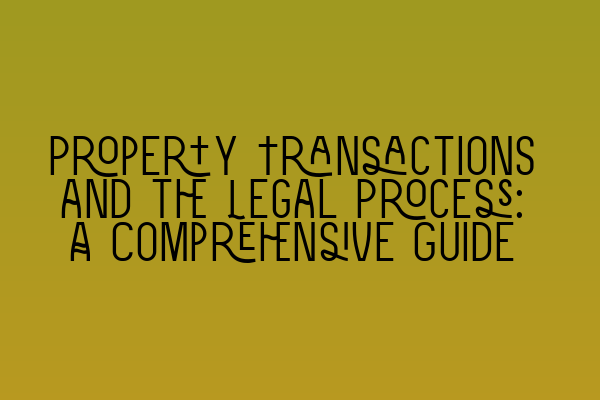Property Transactions and the Legal Process: A Comprehensive Guide
When it comes to property transactions, there are many legal aspects that need to be considered to ensure a smooth and successful process. Whether you are buying, selling, or leasing a property, understanding the legal framework is crucial to protect your interests and avoid any potential complications. In this comprehensive guide, we will take you through the key steps involved in property transactions and provide you with valuable insights to navigate the legal process with confidence.
1. Understanding the Legal Framework
Before diving into the specific steps of a property transaction, it is important to have a clear understanding of the legal framework that governs property law. In the United Kingdom, property transactions are regulated by various laws, including the Land Registration Act 2002, the Law of Property Act 1925, and the Landlord and Tenant Act 1954, to name a few. Familiarizing yourself with these laws will give you a solid foundation to navigate the process.
2. Preparing for a Property Transaction
Prior to engaging in a property transaction, thorough preparation is essential. If you are buying a property, it is important to have your finances in order and obtain a mortgage approval, if necessary. For sellers, ensuring that all necessary documents are in order, such as property title deeds and Energy Performance Certificates, is crucial. Additionally, conducting surveys and inspections can provide valuable information about the property’s condition and potential issues.
If you are considering leasing a property, understanding the terms of the lease and conducting due diligence is important. This includes reviewing the lease agreement, assessing any restrictions or obligations, and considering the implications on your business or personal use of the property.
3. Legal Steps in a Property Transaction
Once you have completed the initial preparation, the legal steps in a property transaction can commence. These steps may vary depending on whether you are buying, selling, or leasing a property. However, some common steps include:
- Instruction of Solicitor: Engaging a solicitor who specializes in property law is highly recommended. They will guide you through the entire process, ensure compliance with legal requirements, and protect your interests.
- Contract Drafting and Negotiation: Your solicitor will draft the contract that outlines the terms and conditions of the transaction. This includes the purchase price, deposit, completion date, and any additional provisions. Negotiations may take place between the parties to reach a mutually acceptable agreement.
- Property Searches: Conducting property searches is crucial to uncover any potential issues, such as land disputes, rights of access, or planning restrictions. These searches provide important information that may impact the transaction.
- Exchange of Contracts: Once the terms of the transaction have been agreed upon, the parties will exchange contracts. At this point, the transaction becomes legally binding, and any breach of the contract may result in significant consequences.
- Completion: The completion date is the day when the property ownership officially transfers. On this day, the balance of the purchase price is paid, and the keys are handed over. For leases, completion may involve the signing of the lease agreement and payment of the first rent installment.
It is important to note that these steps provide a general overview, and there may be additional considerations depending on the specific circumstances of the transaction. Working closely with an experienced solicitor will ensure that all necessary steps are taken and that your interests are protected throughout the process.
4. Post-Transaction Considerations
Once the property transaction is complete, there are a few post-transaction considerations to keep in mind. For buyers, it is crucial to update the ownership records with the Land Registry and ensure that all relevant taxes, such as stamp duty, are paid. Sellers should wrap up any loose ends, such as canceling utility services and notifying relevant parties of the change in ownership. Leases may require ongoing compliance with lease obligations, such as rent payments, maintenance responsibilities, and potential lease extensions.
Conclusion
Property transactions can be complex and involve various legal considerations. Understanding the legal framework, thorough preparation, and seeking professional advice are key to successfully navigating the process. By taking the time to familiarize yourself with the legal steps involved and working with a reputable solicitor, you can achieve a smooth and successful property transaction that protects your interests and ensures peace of mind.
If you are interested in further preparing for the SQE exams or exploring related articles, we recommend checking out the following resources:
- SQE 1 Practice Exam Questions
- SQE 1 Practice Mocks FLK1 FLK2
- SQE 2 Preparation Courses
- SQE 1 Preparation Courses
- SRA SQE Exam Dates
At SQE Property Law & Land Law, our team of solicitors has extensive experience in property transactions and is dedicated to providing professional and reliable services. Contact us today to discuss your property transaction needs and ensure a successful outcome.
